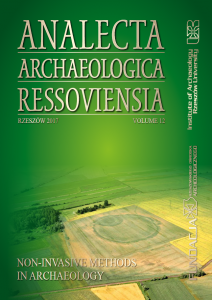The Middle, Late Neolithic and Early Bronze Age Cemetery in Skołoszów, site 7, Dist. Jarosław, in the Light of the Results of Non-invasive Archaeological Survey in 2016
DOI:
https://doi.org/10.15584/anarres.2017.12.3Keywords:
Funnel Beaker culture, Corded Ware culture, Mierzanowice culture, tumuli, long barrows, geomagnetic, non-invasive surveyAbstract
In the autumn of 2016 a geomagnetic survey was conducted in Skołoszów, site. 7, Dist Jarosław. The magnetic prospection took place on a low hill spanning 2.12 ha in total. Distribution of the anomalies, as visible on a map depicting obtained data, reflects numerous structures related to human activity in the area during the prehistory and historic times. Among them are two features interpreted as residues of funerary rituals taking place at the site. One of them pertains to Middle Neolithic earthen long barrow, whereas the second by its shape resembles Late Neolithic/Early Bronze Age tumuli. Apart from the latter, one can discern numerous anomalies potentially related to pits and ditches. Interpretation of the geophysical imagery was based upon the results of excavations conducted in 2010 in the nearby section of Skołoszów, site 7. In the process, funeral structures in the types of earthen long barrow and a presumable tumulus were recorded. Thus, it is possible to confront observations inferred from the results of non-invasive, magnetometric survey, with data obtained by means of more direct exploratory methods. Besides the prehistoric record, our investigation resulted in reconstruction of the trenches most probably dating to the First World War.

